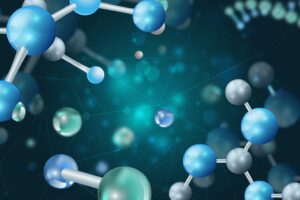We’ve all been told to “cut the sugar” or “watch the carbs,” but what does that actually mean for how our body works? While the internet is full of quick fixes and oversimplified dietary advice, very few explanations dive into how our body processes carbohydrates—and why glucose, a type of sugar, plays a central role in our energy systems.
At DAYHOFF, we believe that understanding your biology is step one in mastering your health. This article breaks down the essentials of how carbohydrates work in your body, with a focus on glucose—your primary source of fuel.
Key Concepts at a Glance
- Your body evolved to handle occasional sugar, not a constant overload
- Glucose is the primary fuel for your cells, managed by the hormone insulin
- Excess glucose is stored as glycogen in the liver and muscles
- A balanced intake of carbs, proteins, and fats is essential for metabolic stability
- Disruption of this balance is at the core of many modern health issues, including metabolic syndrome and type 2 diabetes
The Three Macronutrients: Fueling the Body
Let’s start with the basics. No matter how complex your meal looks, everything you eat is built from three macronutrients:
Carbohydrates
- Function: Main energy source
- Found in: Fruits, grains, vegetables, sugars
- Energy yield: 4 calories per gram
- Role: Quickly broken down into glucose for immediate or stored energy
Proteins
- Function: Growth, repair, and immune function
- Found in: Meat, dairy, legumes, nuts
- Energy yield: 4 calories per gram
- Role: Composed of amino acids that build tissues and regulate hormones
Fats
- Function: Long-term energy and cellular support
- Found in: Oils, seeds, animal fats
- Energy yield: 9 calories per gram
- Role: Essential for hormone production, vitamin absorption, and brain function
Balance matters. A diet rich in one macronutrient and deficient in others can destabilize your body’s delicate energy system.
The Glucose System: Your Body’s Favorite Fuel
Glucose—derived primarily from carbohydrates—is the simplest and most efficient energy source for your body. When you eat carbs, they’re broken down into glucose, which your cells use to make ATP (adenosine triphosphate), the molecule your body uses to power everything from thinking to sprinting.
Why Glucose?
Compared to fats and proteins, glucose is fast and clean—ideal for high-energy demands like brain function or exercise.
Insulin: The Gatekeeper of Your Cells
Here’s where the system gets smart. After you eat, glucose enters your bloodstream. This signals your pancreas to release insulin, a hormone that acts like a key, unlocking your cells so they can absorb glucose.
Think of insulin as the bouncer at the door of your cells—it manages who gets in and how much energy is let through.
Glycogen: Your Built-In Battery Pack
Not all glucose is used right away. What happens to the extra?
It gets converted into glycogen, a form of stored energy housed in your liver and muscles:
- Liver glycogen: ~100g
- Muscle glycogen: 400–500g
During periods of fasting or exercise, your body taps into this reserve, breaking glycogen back down into glucose to keep you running smoothly—even when food isn’t available.
The Dynamic Balance of Glucose and Insulin
This entire system operates on a feedback loop:
- You eat → glucose enters bloodstream
- Insulin is released → glucose is stored or used
- You stop eating → insulin drops
- Stored glycogen is converted back into glucose
When this system works, your blood sugar stays stable and your energy stays balanced.
When it doesn’t? That’s where problems like insulin resistance, prediabetes, and type 2 diabetes start to develop.
Why Balance Is Everything
The glucose system doesn’t operate in a vacuum. While glucose is your main fuel, your body relies on a harmonious mix of all three macronutrients:
- Proteins help maintain muscle mass and metabolic rate
- Fats support long-term energy, hormones, and cognitive function
- Carbs (especially complex ones) supply quick and clean energy
Your body thrives when it can toggle between energy sources seamlessly. But a modern diet heavy in ultra-processed carbs and sugars can short-circuit this balance, overloading the insulin-glucose system and setting the stage for metabolic dysfunction.
Why This Matters Today More Than Ever
Our ancestors evolved to thrive on intermittent sugar availability. Today, we’re faced with constant carbohydrate exposure—from sugar-laden drinks to highly refined snacks.
This mismatch between our evolutionary biology and modern diet is a major driver behind:
- Type 2 diabetes
- Fatigue and brain fog
- Weight gain and obesity
- Insulin resistance
- Inflammatory diseases
At DAYHOFF, we help you reconnect with your biology by providing advanced biomarker testing and personalized lifestyle plans tailored to how your body actually works.
How DAYHOFF Helps You Optimize Your Glucose System
DAYHOFF offers more than just surface-level health advice. With convenient at-home or in-office blood draws, we analyze over 50 healthspan-related biomarkers, including those related to:
- Glucose metabolism
- Insulin sensitivity
- Inflammatory markers
- Hormonal balance
We also provide fitness diagnostics like VO₂ max testing and DEXA scans—giving you a complete picture of your health and metabolic efficiency.
With DAYHOFF, you’ll receive:
Personalized reports based on your unique biomarker profile
Actionable insights to optimize energy, metabolism, and longevity
Expert guidance rooted in cutting-edge health science
The Takeaway
You don’t need to fear carbs—but you do need to understand them.
Mastering your glucose system is about balance, not elimination. By aligning your nutrition and lifestyle with your biology, you can:
- Boost energy
- Prevent chronic disease
- Support your metabolism
- Extend your health span
Ready to Take Control of Your Glucose and Energy?
With DAYHOFF, you don’t have to guess. Let real data guide you toward better health, higher energy, and a longer life.
DAYHOFF: Precision Wellness for a Modern World
We exist to decode your biology and empower your future. Because your health isn’t one-size-fits-all—and your lifestyle shouldn’t be either.



